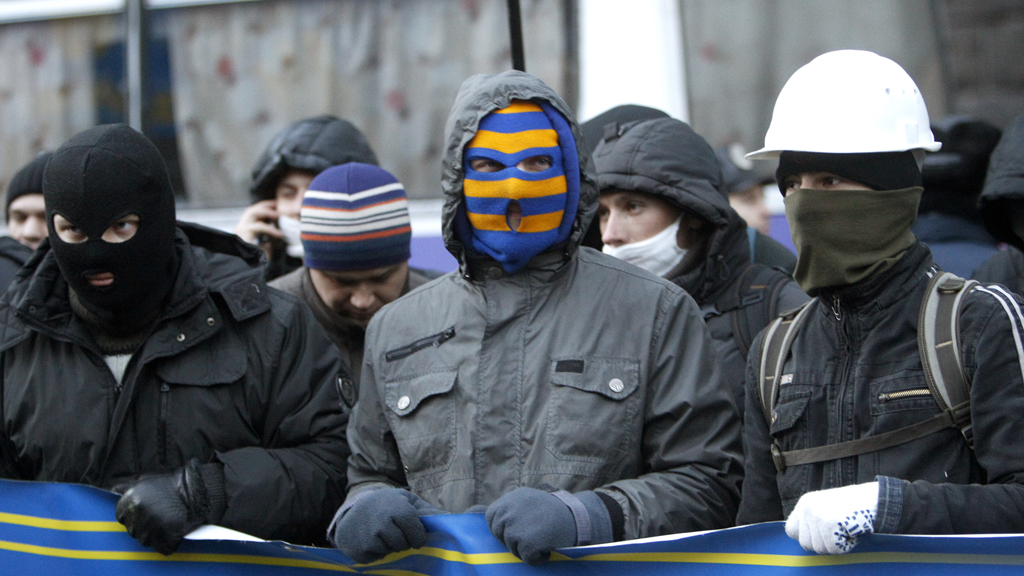Ukraine protesters confront government
Protesters calling for the resignation of the Ukrainian President Viktor Yanukovych blockade government buildings, as calls from foreign ministers for him to listen to their demands grow.
In the biggest demonstrations seen in the former Soviet country since the Orange Revolution nine years ago, hundreds of thousands of protesters have staged mass rallies demanding President Yanukovych’s resignation after he decided that Ukraine would reject a deal which could have paved the way into Europe in favour of closer ties with Russia.
On Monday morning, about 1,000 protesters blocked off the government’s main headquarters and surrounding streets with rubbish bins, metal containers and flower pots, preventing employees from getting to work.
Nearly 10,000 pro-European protesters camped out overnight on Kiev’s Independence Square to try and keep the momentum going.
President Yanukovych appealed for calm, while Russian President Vladimir Putin said the events reminded him of a pogrom rather than a revolution, claiming the protests had been incited by outside actors.
The events were a continuation of what had happened over the weekend, when protesters defied a new ban on demonstrations and headed for the main presidential building, but were met by riot police firing tear gas, stun grenades and batons to disperse crowds.
Streams of cars honked their horns in support on Monday while church bells rang out across the heart of the ancient capital in scenes posing the single biggest challenge to the president’s three-year rule.
Kiev’s city government said that 165 police officers and demonstrators had been injured in the most serious clashes witnessed in Ukraine since the Soviet Union’s demise.
A general strike called by the opposition is taking place. President Yanukovych’s opponents say that he caved in to years of relentless pressure from Russia at Ukraine’s expense.

In his first comments since the unrest over the weekend, President Yanukovych called for only peaceful rallies and appealed to protesters and the police to observe the law.
“Any bad peace is better than a good war,” he said.
Separately, the Prime Minister Mykola Azarov was quoted as saying that the political opposition had the “illusion” that it would overthrow the existing order. “We know that a plan is being prepared to seize the Parliament,” he said.
Russia’s President Vladimir Putin said the protests were an attempt to shake Ukraine’s legitimate rulers. “This reminds me more of a pogrom than a revolution,” he said.
Germany said on Monday that the mass rallies showed that “the heart of the Ukrainian people beats in a European way”.
“The demonstrations are an impressive commitment to Europe by hundreds of thousands of people in Ukraine,” added Germany’s outgoing Foreign Minister Guido Westerwelle.
Chancellor Angela Merkel’s spokesman Steffen Seibert said “the demonstrations send a very clear message. Hopefully Ukrainian President Yanukovych is hearing this message”.
“For the (German) government it is very impressive to see how many people in Ukraine are willing to stand up for their convictions, for their dream of a Ukraine that shares Europe’s idea about the rule of law and its values and who therefore seek closer ties, closer relations with Europe,” he added.
The spokesman added that “the use of violence against peaceful protesters must be a cause for concern”, urged all sides to avoid further escalation, and called on Ukraine’s government to protect the rights to free speech and assembly.
At the start of the rallies 11 days ago, protests were organised and were split across two squares; the opposition were in one, while pro-European protesters took to Independence Square.
The weekend’s protests were spontaneous, however, and saw the demonstrators combine with the opposition.
Fedir Kurlak, chief executive officer of the Association of Ukrainians in Great Britain, said that for the protesters, the battle was over whether the country would pursue a path towards democracy, as symbolised by Europe, or slide back towards its Soviet past.
“It’s about the key issues of freedom and democracy, and European values and not being sent down the route of corruption and a judicial system that isn’t free and fair,” he said.
“People have recalled the Orange Revolution and are trying to reinstate those values. They are looking for what might materialise in the end.”

Mr Kurlak said that while President Yanukovych would be unlikely to relinquish power easily, much rested upon the tenacity of the protesters.
He said: “It depends on how determined the protesters are. He can’t resort to the brutal tactics that would be used in the Soviet Union; he’s probably just sitting there and hoping it will go away, and it won’t. It really does depend on the determination of the people.”
Early indications, said Mr Kurlak, are that some politicians who would normally vote with the government are beginning to side with the opposition and protesters.
“The government won’t resign willingly, but it depends on what pressure the protesters put on,” he said.
-
Latest news
-
‘I violated my moral compass working for Trump,’ former lawyer testifies3m

-
Working class creatives in film and TV at lowest level in decade5m

-
Israeli police investigating attack on Gaza aid convoy4m

-
Biden announces major tariff increase on Chinese-imported green tech3m

-
‘If NHS can afford it, people with obesity should have Semaglutide,’ says weight loss expert5m

-




